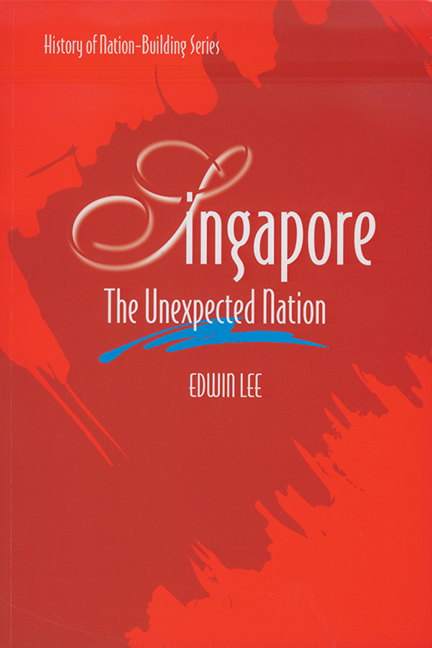Book contents
- Frontmatter
- Dedication
- Contents
- Preface
- Introduction by Wang Gungwu
- Chapter One Beginnings: From Temasek to Singapore
- Chapter Two Race, History and Nationalism
- Chapter Three Contestants and Contesting Visions
- Chapter Four The Accidental Chief Minister
- Chapter Five The Terminal Chief Minister
- Chapter Six The Embattled Prime Minister
- Chapter Seven Merger: Contesting Ownership and Principles
- Chapter Eight Terms of Disendearment
- Chapter Nine Dare to be Equal
- Chapter Ten The Way to Survive
- Chapter Eleven National Service: The Price of Independence
- Chapter Twelve Politics of Education
- Chapter Thirteen Home Ownership, National Stability and the New Middle Classes
- Chapter Fourteen University and Nation
- Chapter Fifteen Toh's Nation-Building Thrust
- Chapter Sixteen Nantah: Between Community and Nation
- Chapter Seventeen Self-Renewal: Talents for a Tough Act
- Chapter Eighteen The Consensual Prime Minister
- Chapter Nineteen Confucianism, Christianity, Chineseness
- Chapter Twenty Singapore Dreams, Singapore Dilemmas
- Chapter Twenty-One The Hyphenated Singaporean
- Chapter Twenty-Two The Unexpected Nation
- Bibliographical Note
- Index
- The Author
Chapter Four - The Accidental Chief Minister
Published online by Cambridge University Press: 21 October 2015
- Frontmatter
- Dedication
- Contents
- Preface
- Introduction by Wang Gungwu
- Chapter One Beginnings: From Temasek to Singapore
- Chapter Two Race, History and Nationalism
- Chapter Three Contestants and Contesting Visions
- Chapter Four The Accidental Chief Minister
- Chapter Five The Terminal Chief Minister
- Chapter Six The Embattled Prime Minister
- Chapter Seven Merger: Contesting Ownership and Principles
- Chapter Eight Terms of Disendearment
- Chapter Nine Dare to be Equal
- Chapter Ten The Way to Survive
- Chapter Eleven National Service: The Price of Independence
- Chapter Twelve Politics of Education
- Chapter Thirteen Home Ownership, National Stability and the New Middle Classes
- Chapter Fourteen University and Nation
- Chapter Fifteen Toh's Nation-Building Thrust
- Chapter Sixteen Nantah: Between Community and Nation
- Chapter Seventeen Self-Renewal: Talents for a Tough Act
- Chapter Eighteen The Consensual Prime Minister
- Chapter Nineteen Confucianism, Christianity, Chineseness
- Chapter Twenty Singapore Dreams, Singapore Dilemmas
- Chapter Twenty-One The Hyphenated Singaporean
- Chapter Twenty-Two The Unexpected Nation
- Bibliographical Note
- Index
- The Author
Summary
Malayan Repercussions on Singapore
The Alliance Party made the winning of independence the foremost issue in the federal election which swept it to power. But the Emergency consequent on the communist insurgency, now in its eighth year, could be a pretext for the British to delay the constitutional process. The Alliance saw this issue as both obstacle and opportunity. The Alliance manifesto set out the aim to end the Emergency and bring peace through an offer of amnesty to the communists.
The MCP had been watching the political scene and concluding about the same time as the British did, that the Alliance was the rising contender. It befitted the MCP, therefore, to respond to the offer of amnesty.
Why was the MCP willing to discuss amnesty? It was because the guerrilla war was all but lost, and the guerrillas were starving in the jungle. Food denial was the simple idea ruthlessly implemented by Lieutenant- General Sir Harold Briggs, director of operations in Malaya from 1950–52. In less than three years, the Briggs plan moved 470,509 rural squatters into 440 new villages. Templer improved on it by ordering centralised cooking facilities. This reduced the chances of people carrying food supplies intended for the guerrillas through village main gates.
Chin Peng replied to the amnesty offer in May 1955, choosing the moment when the federal election had been announced, and the date set for the dissolution of the federal legislative council. Chin Peng addressed his letter to the Federation Government headed by the British high commissioner, as the Alliance, the proposer of the amnesty, was not yet in office. A copy of the letter was sent to the newly elected chief minister of Singapore, David Marshall (who is the main subject of this chapter, and whose appearance here indicates the integral oneness of Malaya and Singapore in history). Chin Peng's letter asked to discuss amnesty terms, but High Commissioner MacGillivray, after consultations in London, declared that the MCP must first surrender. So nothing came of Chin Peng's response.
The federal election in July brought the expected Alliance victory. Tunku Abdul Rahman became the chief minister (a title which was changed to prime minister on independence).
- Type
- Chapter
- Information
- SingaporeThe Unexpected Nation, pp. 99 - 130Publisher: ISEAS–Yusof Ishak InstitutePrint publication year: 2008

